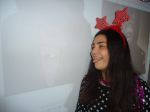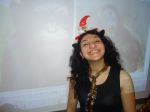|
...................................................................................................................................................................................................................................................................................
Exercise
1. Поставьте выделенные жирным
шрифтом слова в начале предложения и
сделайте необходимые изменения:

Student
1.
I have
never
heard such a
beautiful voice. 2. He had hardly
stopped speaking when
a loud knock was heard at the door. 3. An old house stood at
the coner of the square. 4.
They were no
sooner under
shelter than the storm broke out. 5. All her efforts to persuade him
were in vain.
6. I pointed out in
vain that
it was useless to go there. 7. He not
only promised
to help me, but he placed all his books at my disposal. 8.
If they were
to come tomorrow, we
should be very glad. 9. If it had
not been so stormy,
we should have reached the top of the mountain.
Переведите
на английский язык:
1. «Садитесь,
пожалуйста», - сказал врач. 2. «Как ты
себя чувствуешь?» - спросил меня отец.
3. «Я буду здесь завтра в 7 часов», - сказал
он. 4. Вот ваш словарь. 5.
Вот они! 6. Вот ваши
тетради. 7. Вот ваша аудитория. 8. Где мой
учебник? - Вот он. 9.
«Я очень рад вас
видеть», - сказал Джек, пожимая ему руку.
10. Напрасно они старались убедить его
поехать туда. 11. Не успел пароход прибыть
в порт, как разразилась буря. 12. Никогда
я этого не говорил. 13. У подножья горы
стоял маленький домик. 14.
Справа от нас было
озеро, а слева была высокая гора. 15. Не
успел он придти домой, как раздался
звонок.
Exercise
2. Напишите следующие предложения
в отрицательной форме:
1.
You must go there tomorrow. 2. You can wait here. 3. They often go to
the pictures. 4.
The meeting
began at 7 o’clock. 5. The examination was very easy. 6. We shall
arrive there in time for supper. 7. He is leaving for St. Petersburg
next week. 8. He has returned to Moscow. 9. He has a brother. 10.
There is some soap on the shelf. 11. There is a TV set in this room.
12. He gave me some interesting books to read. 13. There is someone
in the room. 14. Put some milk in my tea. 15. He asked some
questions. 16. He has bought something. 17. He intends to go
somewhere in the summer.
Exercise
3. Переведите на английский язык:

Student
1. Он теперь
работает не в нашем университете. 2. Они
живут не в этом городе. 3. Я вижу его не
каждый день. 4. В субботу я прихожу домой
не поздно. 5. Он потратил не много времени
на эту работу. 6. Он говорит негромко. 7
Он прислал мне не английские книги; он
прислал мне французские. 8. Он живет
теперь не в Петербурге, он живет в Москве.
9. Он рассказывал мне не о своей поездке
на Кавказ, он рассказывал мне о своей
поездке на Дальний Восток. 10. Она преподает
не английский язык, она преподает
немецкий язык. 11. Он просил меня не брать
его книг. 12. Он не просил меня помочь
ему. 13. Я просил его не приходить сюда.
14. Я не просил его приходить сюда.
Exercise
4.
1. Он никогда
ничего не рассказывал мне об этом. 2. Я
никогда нигде не встречал его раньше.
3. В этих книгах нет ничего об этом. 4.
Никго не мог сказать мне его номер
телефона. 5. Когда я вошел, в доме никого
не было. 6. Ни мой отец, ни я не знали об
этом. 7. Он никуда не хочет идти ни сегодня,
ни завтра. 8. Никго никогда не спрашивал
меня об этом. 9. Она никогда ни с кем не
говорила на эту тему. 10.
Он не читал ни этой
статьи, ни той. 11. Я никогда ничего не
слыхал о нем. 12.
Ничего не было
сказано об этом.
Exercise
5. Напишите следующие предложения
в вопросительной форме:
1.
Не speaks
Chinese very well. 2. His father was a lawyer. 3. These books were
published in St. Petersburg. 4. He wrote them a letter from Moscow.
5. The weather will be fine tomorrow. 6. All books must be returned
to the library before the 1st of July. 7. I ought to have done it. 8.
He has been working hard for the last 6 months. 9. He has a bike. 10.
This box
weighs more than that one. 11. He can play well. 12. He is working at
the factory. 13. They were glad to see him. 14. These boys like
reading travel stories.
Exercuse
6. Напишите следующие предложения
в вопросительно-отрицательной форме:
1.
The book was interesting. 2. He went to the Caucasus last summer. 3.
He can play tennis. 4. He has finished his plan. 5. He knows her
name. 6. We shall be able to spend a month there. 7. He would like to
come with us. 8. I am studing hard. 9. He will come in the evening.
10. She knows that man. 11. They were glad to see him. 12. They
are
at
the
office.

Student
|
Answers
|
|
Exercise
1. 1.
Never have I heard .... 2. Hardly had he stopped speaking when
.... 3. At the corner of the square stood an old house. 4. No
sooner were they under shelter than ... . 5. In vain were all her
efforts ... . 6. In vain did I point out that ... . 7. Not only
did he promise to help me ... . 8. Were they to come tomorrow ...
. 9. Had it not been so stormy ... .
1. “Sit
down, please,” said the doctor. 2. “How do you feel?” the
father asked me. 3.
“I’ll
be here at 7 o'clock tomorrow,” he said. 4. Here is your
dictionary. 5. Here they are! 6.
Here are
your exercise-books. 7. Here is your classroom. 8. Where is my
textbook? - Here it is. 9. “I am very glad to see you,” said
Jack, shaking his hand. 10. In vain did they try to persuade him
to go there. 11. No sooner had the steamer arrived at the port
(or:
in port) than a
storm broke out. 12. Never have I said it. 13. At the foot of
the-mountain
stood a little house. 14. On our right was a lake, and on our left
was a high mountain. 15.
No sooner
had he come home than the bell rang.
Exercise
2. 1.
You mustn’t
go there tomorrow. 2. You can’t wait here. 3. They don’t often
go to the pictures. 4. The meeting didn’t begin at 7 o’clock.
5. The examination wasn't very easy. 6.
We shan’t
arrive there in time for supper. 7. He isn’t leaving for
St.Petersburg next week. 8.
He hasn’t
returned to Moscow. 9. He hasn't a brother (or:
He has no
brother). 10.
There isn't
any soap (or:
There is no soap)
on the shelf. 11. There isn’t a TV set (or:
There is no TV
set) in this room. 12. He didn’t give me any (or:
He gave me no)
interesting books to read. 13. There isn’t anyone (or anybody)
in the room (or There is no one (or
nobody) in the
room). 14. Don’t put milk in my tea. 15. He didn’t ask any
questions (or: He
asked no questions). 16. He hasn’t bought anything (or:
He has bought
nothing). 17.
He doesn’t
intend to go away anywhere in the summer.
Exercise
3. 1.
He doesn’t work at our University now. 2. They don’t live in
this city. 3. I don’t see him every day. 4.1 don't come home
late on Saturday. 5. He didn't spend much time on this work. 6. He
doesn’t speak loudly. 7. He hasn’t sent me English books; he
has sent me French books. 8. He doesn’t live in St.Petersburg
now; he lives in Moskow. 9. He didn’t tell me about his trip to
the Caucasus, he told me about his trip to the Far East. 10. She
doesn't teach English, she teaches German. 11. He asked me not to
take his books. 12. He didn't ask me to help him. 13. I asked him
not to come here. 14. I didn’t ask him to come here.
Exrcise
4. 1.
He has never told me anything about it. 2. I have never met him
anywhere before. 3. There
isn’t anything (or:
There is nothing)
about it in these books. 4. Nobody could tell me his telephone
number. 5. When I entered there wasn’t anybody (ас-there
was nobody) in the house. 6. Neither my father nor I knew about
it. 7. He doesn’t want to go anywhere either today or tomorrow.
8. Nobody has ever asked me about it. 9. She has never spoken to
anyone on this subject. 10. He hasn’t read either this article
or that one. 11.1 have never heard anything about him. 12. Nothing
has been said (or:
was said) about
it.
Exercise
5. 1. Does he speak Chinese very well? 2. Was
his father a lawyer? 3. Were these books published in
St.Petersburg? 4. Did he write them a letter from Moscow? 5. Will
the weather be fine tomorrow? 6. Must all books be returned to the
library before the 1st of July? 7. Ought I to have done it? 8. Has
he been working hard for the last six months? 9. Has he a bike?
10. Does this box weigh
more than that one? 11. Can he play well? 12. Is he working at the
factory? 13. Were they glad to see him? 14. Do these boys like
reading travel stories?
Exercise
6. 1.
Wasn’t the book interesting? 2. Didn’t he go to the Caucasus
last summer? 3. Can’t he play tennis? 4. Hasn’t he finished
his plan? 5. Doesn’t he know her name? 6. Shan't we be able to
spend a month there? 7. Wouldn't he like to come with us? 8. Am I
not studying hard? 9. Won’t he come in the evening? 10. Doesn’t
she know that man? 11.
Weren’t they glad to see him? 12. Aren’t they at the office?
|
|

